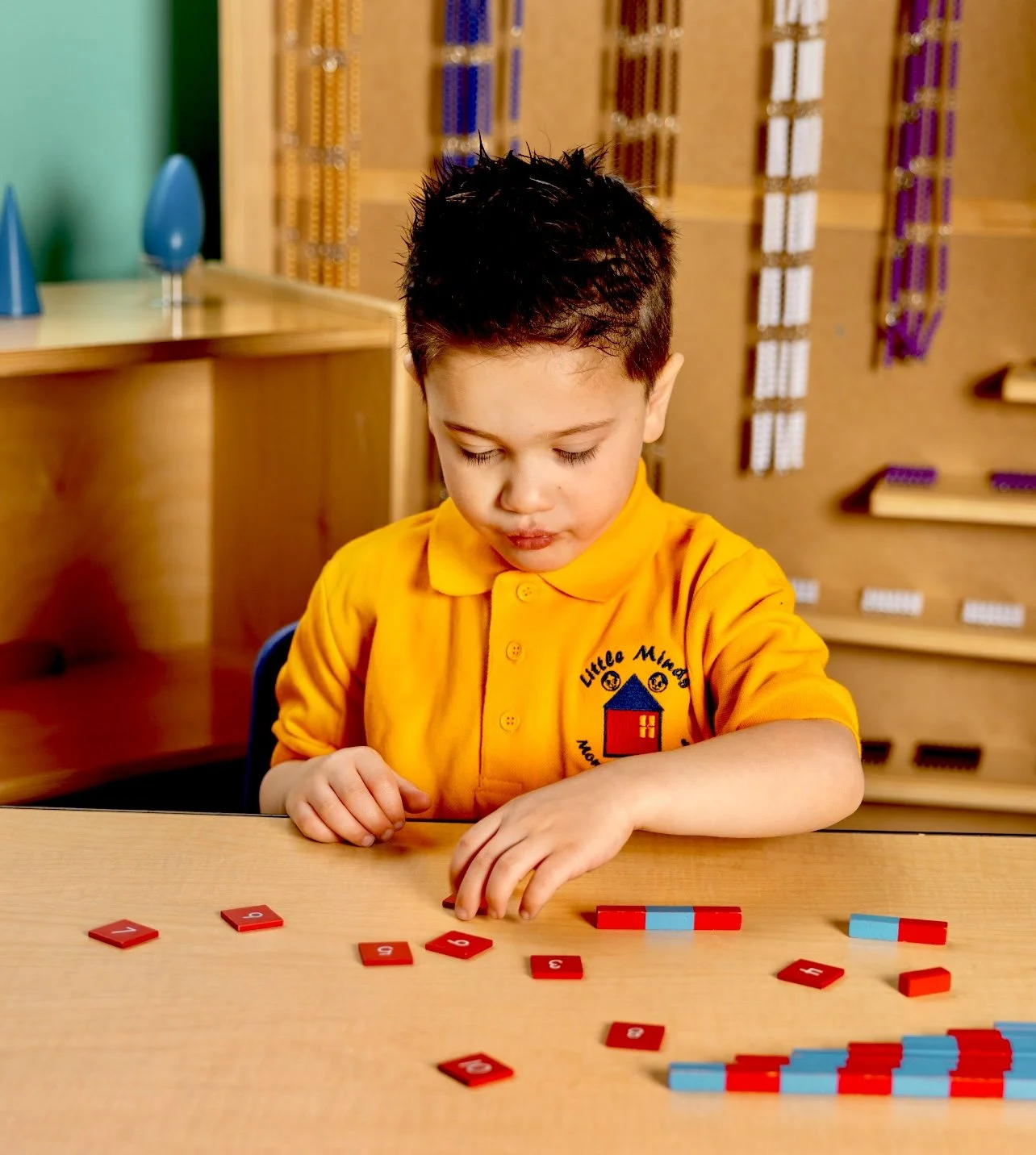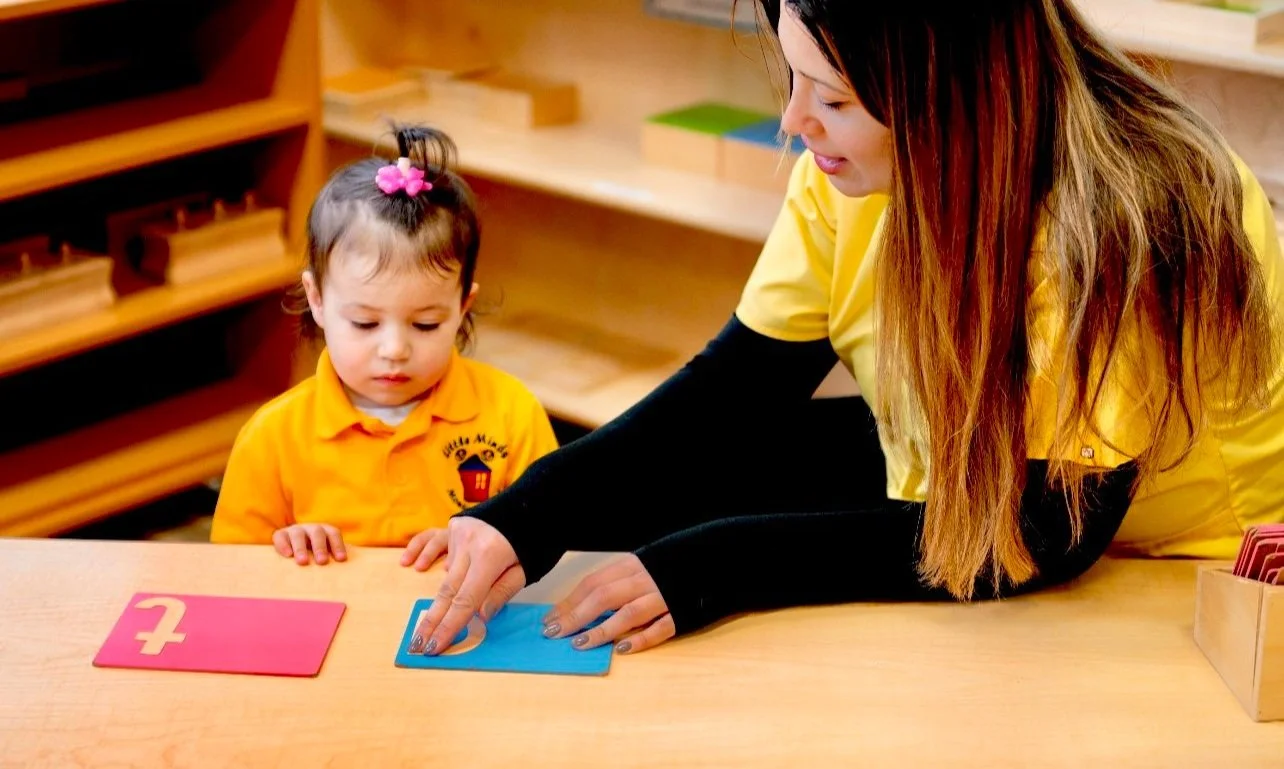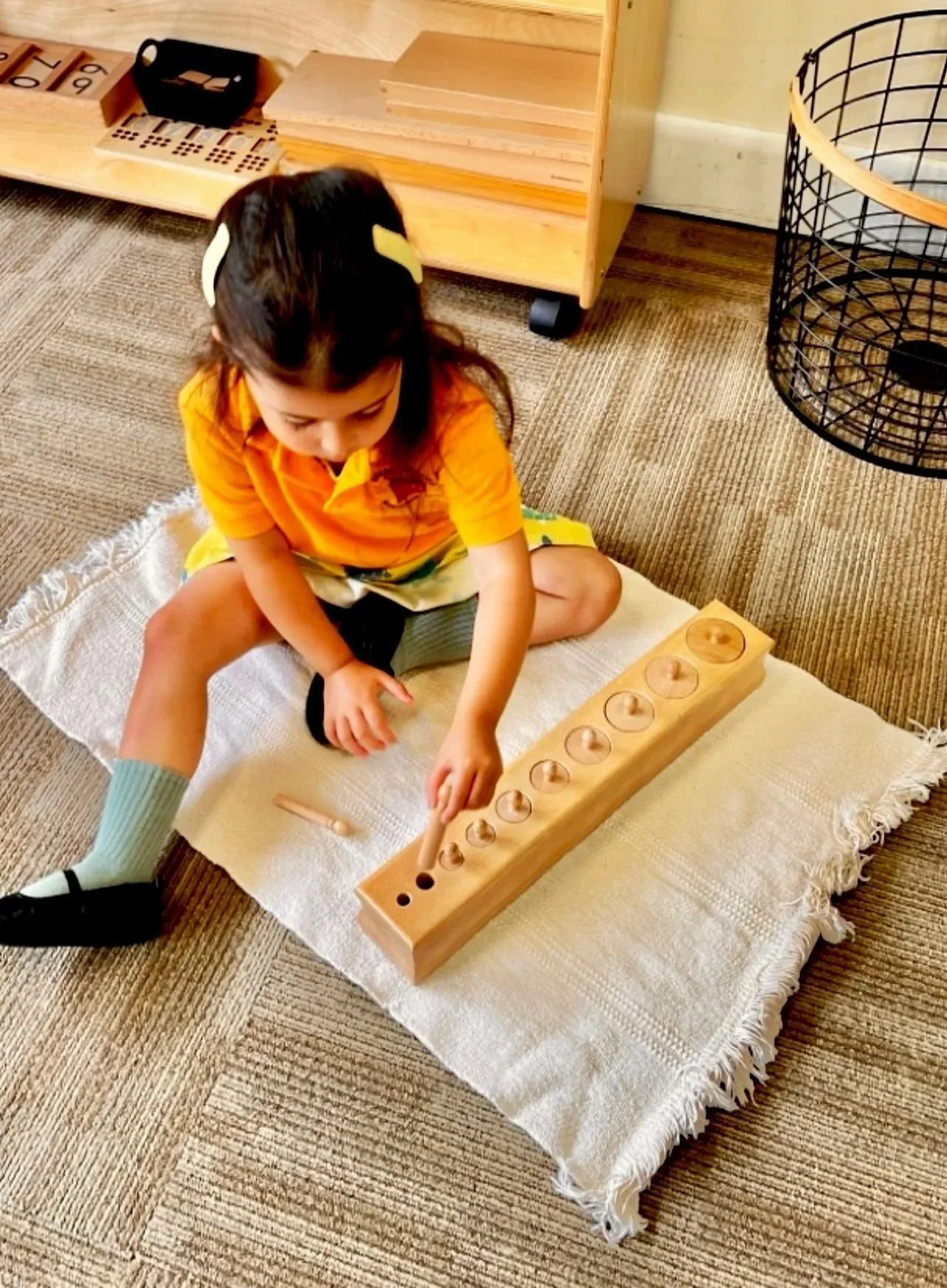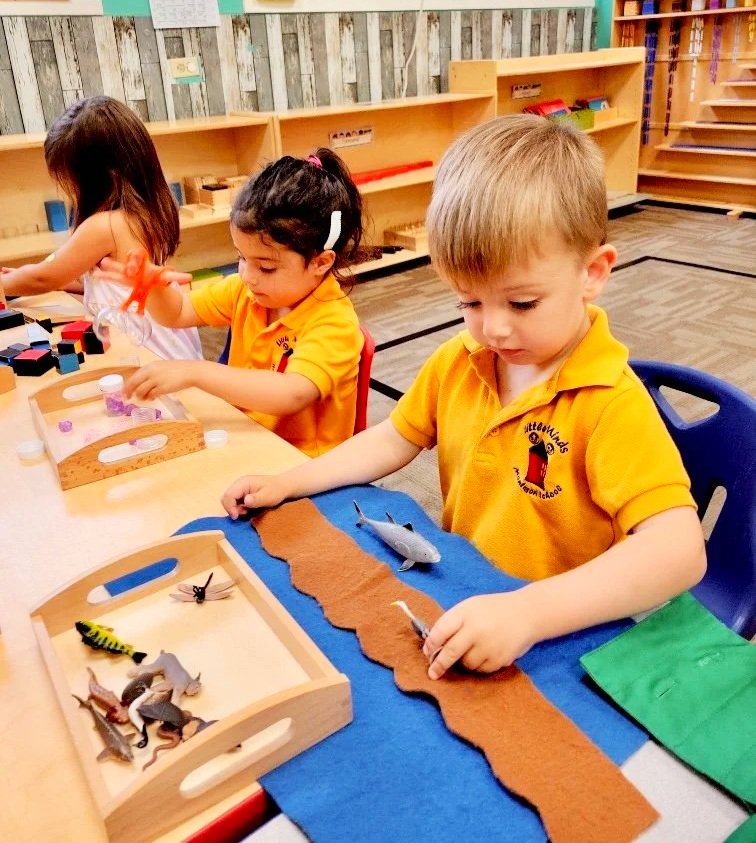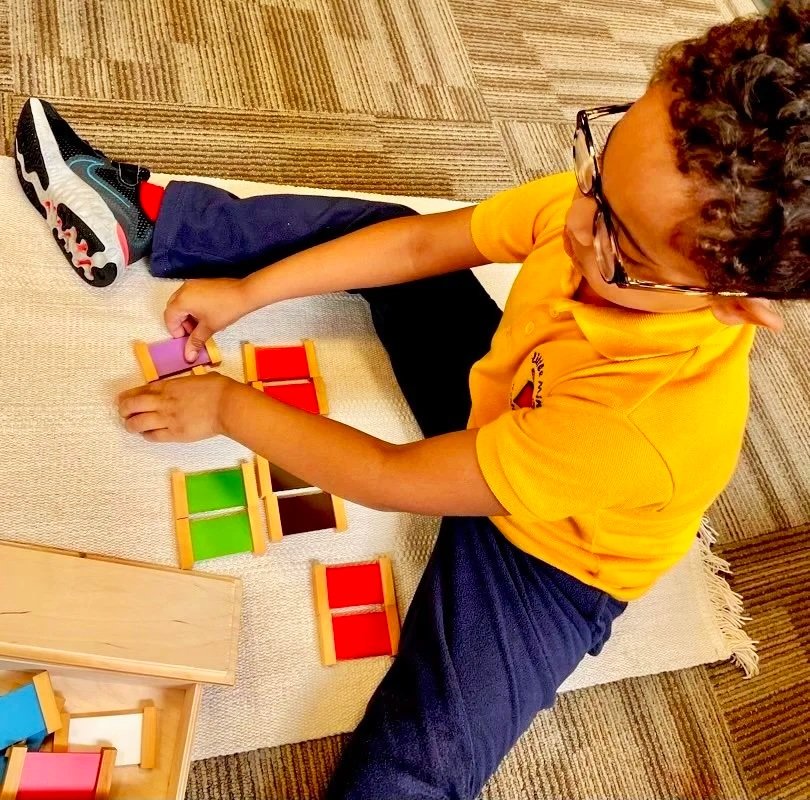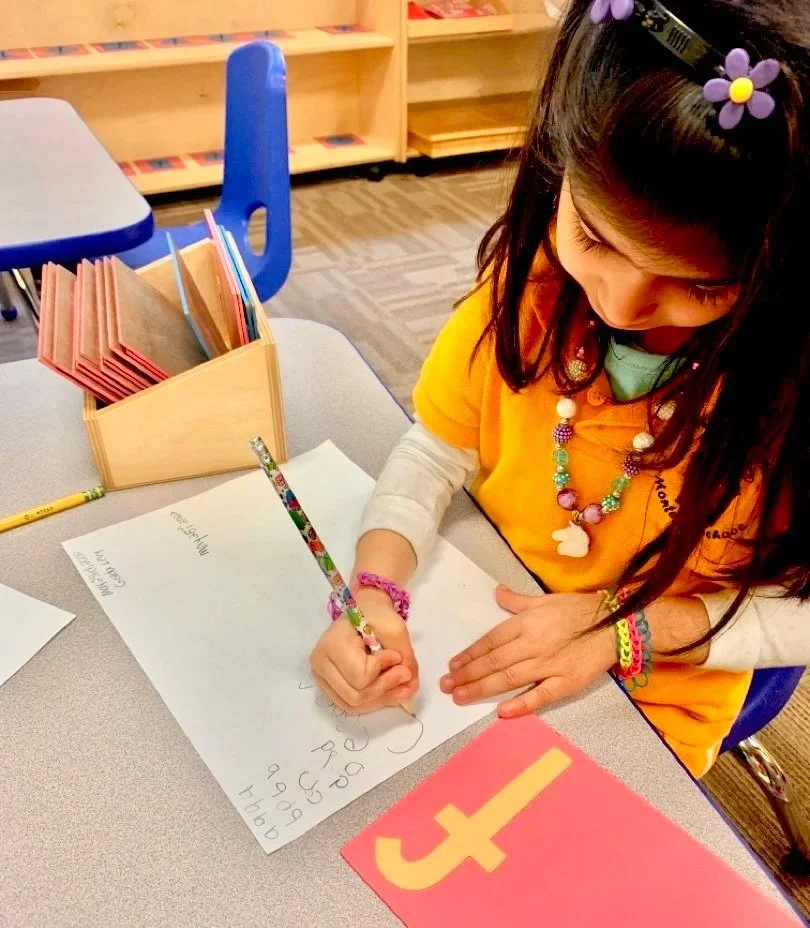
Program & Curriculum
Program Overview
At Little Minds Montessori, our curriculum is thoughtfully individualized to match each child’s unique learning pace and ability. We do not group children by age alone. With a low teacher to student ratio, we are able to fully implement the Montessori method, providing personalized guidance that meets the diverse developmental needs of each child.
The Montessori Method
Rooted in the pioneering work of Dr. Maria Montessori, this child-centered approach nurtures independence, curiosity, and a lifelong love of learning. In thoughtfully prepared environments, children engage in hands-on, self-directed activities that build essential skills at their own pace. This method fosters self-discipline, creativity, and a strong sense of responsibility, laying the foundation for future success.
At Little Minds Montessori, we embrace each child’s unique learning journey. Our low student-to-teacher ratio allows for personalized attention and meaningful engagement. Through gentle guidance and consistent encouragement, our educators help children grow with confidence, joy, and a strong sense of purpose.
Beyond academics, our classrooms cultivate empathy, respect, and social awareness. Children learn to collaborate, communicate, and care for their environment and one another. These core values remain with them long after they leave our doors, shaping thoughtful, capable individuals ready to thrive in an ever-changing world.
Preschool Program
At Little Minds Montessori, our Preschool Program offers a rich and thoughtfully prepared environment that nurtures each child’s natural curiosity, independence, and joy in learning. Rooted in the Montessori philosophy, this program is designed to support children during their most formative years by cultivating academic readiness, emotional well-being, and social responsibility.
The Montessori classroom functions as a peaceful and purposeful space where children freely choose from a range of developmentally appropriate, self-correcting materials displayed on open shelves. They work individually or in small groups within clearly defined areas, developing concentration, confidence, and care for their environment. Over time, the class becomes a focused and respectful learning community.
This transformation is known as normalization, a developmental process in which children move from distraction to concentration, from disorder to order, and from dependence to self-discipline. This inner shift is guided by repeated interaction with meaningful activities that hold their attention and support their growth. Academic learning is not an end in itself but a path toward developing independence, critical thinking, and a deep sense of self.
Our curriculum is built upon five core areas of Montessori education:
Practical Life
Children engage in purposeful activities that strengthen fine motor control, coordination, and focus. Tasks such as pouring, zipping, buttoning, and food preparation help children develop independence, responsibility, and pride in their accomplishments. These foundational skills promote order, confidence, and readiness for academic learning.
Sensorial
This area offers carefully designed materials that isolate qualities such as size, color, shape, texture, weight, and sound. Through hands-on exploration, children refine their senses, strengthen cognitive classification, and build the foundation for understanding abstract concepts in math, language, and science.
Language
The classroom is rich with opportunities for oral language development, storytelling, vocabulary building, and writing. Children begin by associating sounds with letter symbols through tactile materials such as sandpaper letters and alphabet cutouts. As they progress, they learn to write and read fluently, expressing their thoughts with clarity and confidence.
Mathematics
Through beautifully crafted materials, children explore number sense, quantity, sequencing, and operations. The hands-on approach allows children to internalize complex mathematical ideas through concrete experiences, preparing them for abstract thinking with a solid foundation in logic and problem-solving.
Culture
This area introduces children to geography, history, life sciences, music, and art. Cultural studies encourage an appreciation for the world’s diversity and foster curiosity about how people live, how the natural world works, and how creativity shapes human experience. These lessons promote global awareness, creativity, and respect for others.
The Montessori preschool environment is designed to support every aspect of the child’s development - intellectual, social, emotional, and physical. Its goal is to foster a lifelong love of learning and to cultivate essential traits such as independence, curiosity, concentration, initiative, order, persistence, and a strong sense of responsibility toward others. With this holistic foundation, children are well prepared to succeed both academically and in life.
Dr. Maria Montessori (1870 – 1952), was an Italian physician, educator, philosopher, and humanitarian. She was the originator of the Montessori Method of Education.
Dr. Montessori was the first woman to become a doctor of medicine in Italy. While working with physically and emotionally challenged children in a Rome clinic, Dr. Montessori observed the positive impact on the learning process when the children worked with specially designed equipment. It was this observation that inspired her to design special learning materials that revolutionized the teaching of basic skills for all students. In 1907, she directed her first school “Casa Dei Bambini.” World famous educators visited her school in Italy to observe the impact on the learning process as the children used her carefully designed materials. The visitors also discovered the new method of education was characterized by emphasizing self-directed activity on the part of the child.
Montessori stressed the importance of adapting the child’s learning environment to his or her development level. It was clear that the role of physical activity was extremely important in helping the children to grasp abstract concepts and in learning practical skills.
Dr. Montessori then felt the need to educate adults caring for children and she traveled to Asia, Europe and America to train teachers in the use of her method and her equipment. Her educational method is in use today in public as well as private schools throughout the world.
The Montessori Preschool 2 ½ – 6 Year Program
The Montessori preschool classroom is a “living room” for children. Children choose their work from among the self-correcting materials displayed on open shelves, and they work in specific work areas.
Over a period of time, the children develop into a “normalized community,” working with high concentration and few interruptions. Normalization is the process whereby a child moves from being undisciplined to self-disciplined, from disordered to ordered, from distracted to focused, through work in the environment. The process occurs through repeated work with materials that captivate the child’s attention. For some children this inner change may take place quite suddenly, leading to deep concentration. In the Montessori preschool, academic competency is a means to an end, and the manipulative are viewed as “materials for development.”
In the Montessori preschool, five distinct areas constitute the prepared environment:
Practical Life enhances the development of task organization and cognitive order through care of self, care of the environment, exercises of grace and courtesy, and coordination of physical movement.
The Sensorial Area enables the child to order, classify, and describe sensory impressions in relation to length, width, temperature, mass, color, pitch, etc.
Mathematics makes use of manipulative materials to enable the child to internalize concepts of number, symbol, sequence, operations, and memorization of basic facts.
Language Arts include oral language development, written expression, reading, the study of grammar, creative dramatics, and children’s literature. Basic skills in writing and reading are developed through the use of sandpaper letters, alphabet cut-outs, and various presentations allowing children to link sounds and letter symbols effortlessly and to express their thoughts through writing.
Cultural Activities expose the child to basics in geography, history, and life sciences. Music, art, and movement education are part of the integrated cultural curriculum.
The preschool environment unifies the psycho-social, physical, and academic functioning of the child. Its important task is to provide students with an early and general foundation that includes a positive attitude toward school, inner security and a sense of order, pride in the physical environment, abiding curiosity, a habit of concentration, habits of initiative and persistence, the ability to make decisions, self-discipline, and a sense of responsibility to other members of the class, school, and community.
This foundation will enable them to acquire more specialized knowledge and skills throughout their school career.
Seasonal Activities
In addition to the core Montessori curriculum, children at Little Minds Montessori participate in a variety of seasonal activities that enrich their understanding of the natural world, celebrate community traditions, and foster creativity.
Throughout the year, children are introduced to:
Decorating the classroom bulletin board with seasonal themes and artwork
Reading stories and books that reflect the changes and traditions of each season
Singing seasonal songs that connect music with nature and holidays
Exploring weather patterns and observing changes in the environment
Learning about animal behaviors such as hibernation and migration
Participating in autumn experiences like apple picking, tasting, and pumpkin carving
Celebrating Halloween with a festive costume parade
Taking part in a Thanksgiving celebration that emphasizes gratitude and community
Engaging in hands-on gardening activities during the spring
Showcasing their talents and joy in the annual Winter Concert
These activities are woven into the school year to inspire wonder, deepen seasonal awareness, and create joyful memories that complement each child’s Montessori journey.
Yoga
What can yoga do for your child? Amazingly there are so many things that your child can learn from yoga apart from just a way to stay healthy.
Yoga teaches your child:
Body Coordination
Confidence
Flexibility
Focus
Gracefulness
Posture
Strength
Music
Little Minds Montessori’s Music Classes will nurture young children in developing more than just musical skills – it also promotes development in language, literacy, social skills, math (rhythm) and the confidence in self-expression.
This program includes a wonderful interlace of experiences for your child:
Musical concepts
Musical terms
Instrument play
Singing / Voice Lessons
Movement / Action Songs
Cognitive Development
Besides these, it’s a load of fun for your child to experience yoga and music with other children of their age. To enroll your child in the yoga and music program at Little Minds Montessori.

Have your child experience the joy of Summer at our
Summer Fun Activity Program right here
Little Minds Montessori!
Our Summer Fun Activity Program brings learning to life with exciting events like a Magic Show, Mobile Petting Zoo Visit, Science Experiment Demonstrations by the Long Island Children’s Museum, and the Party Fun Bus! Children will enjoy outdoor planting, painting, and picnic activities, get creative with Arts & Crafts Fun, move to the rhythm with Music and Movement, and cool off with Outdoor Water Fun and Sand Table Play.
All activities take place at our location with no outside trips. Have a view at our gallery below of some of our sweet summer moments!
Call (516) 613-3335 or schedule a tour to secure your child’s place today!
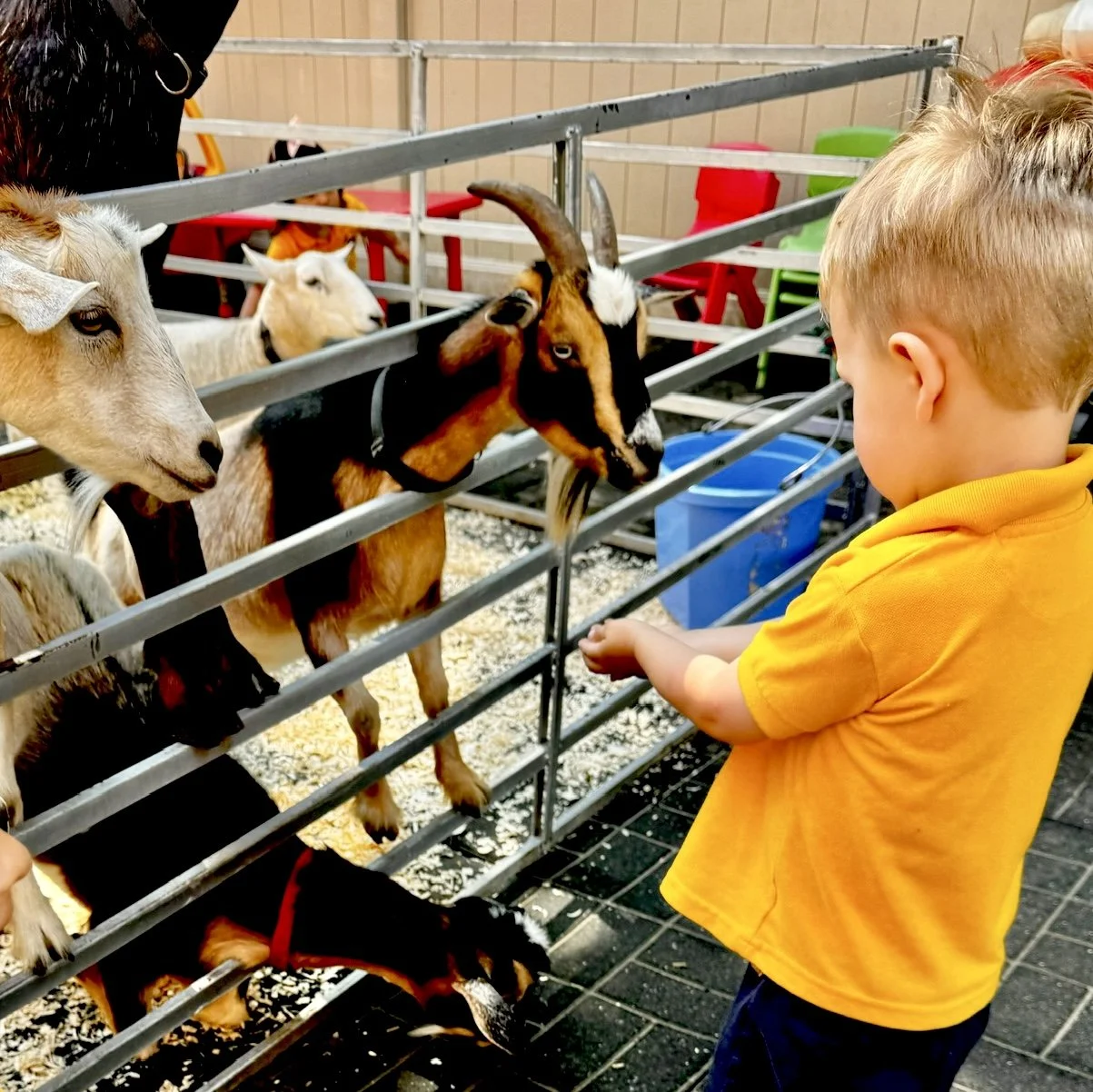
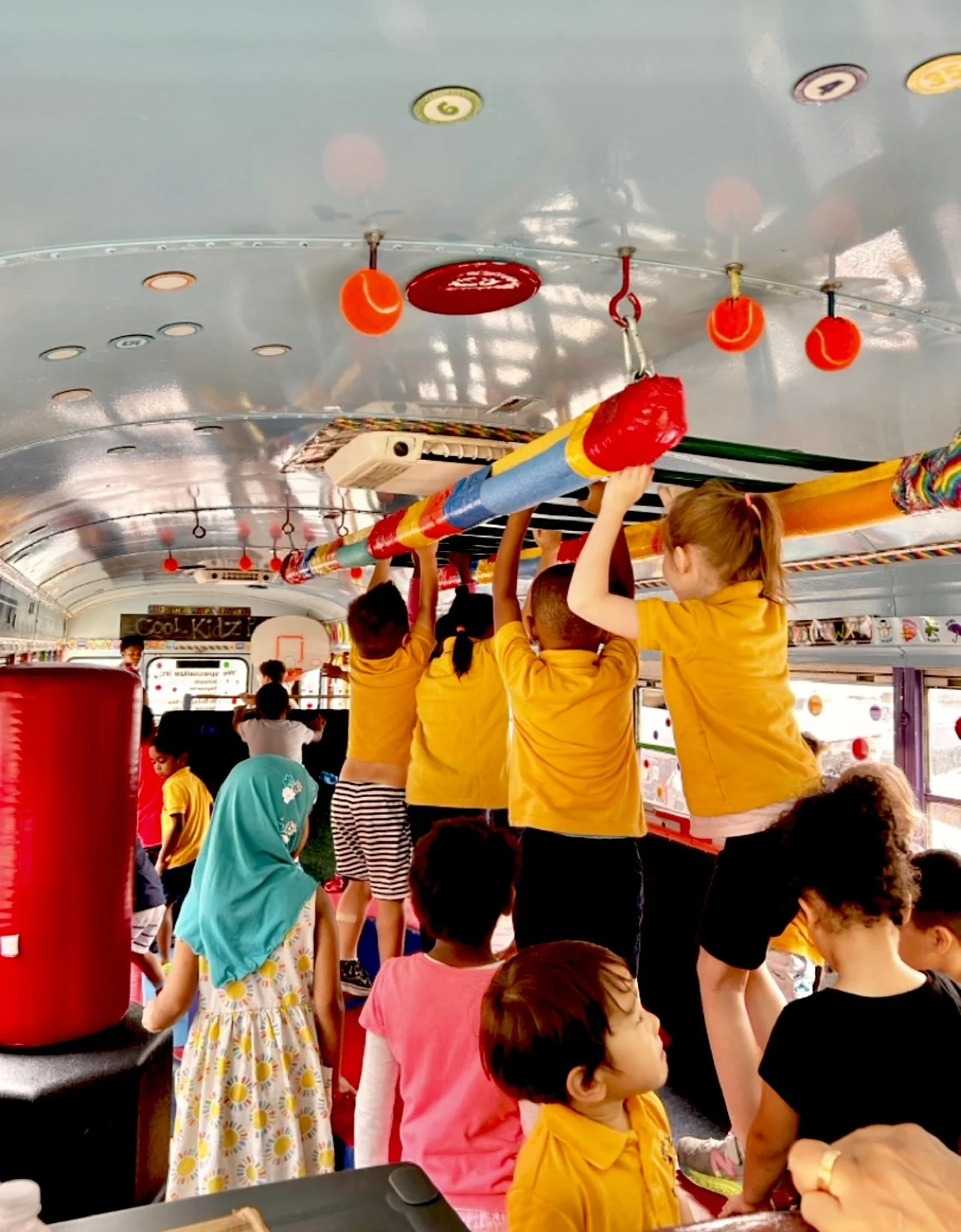
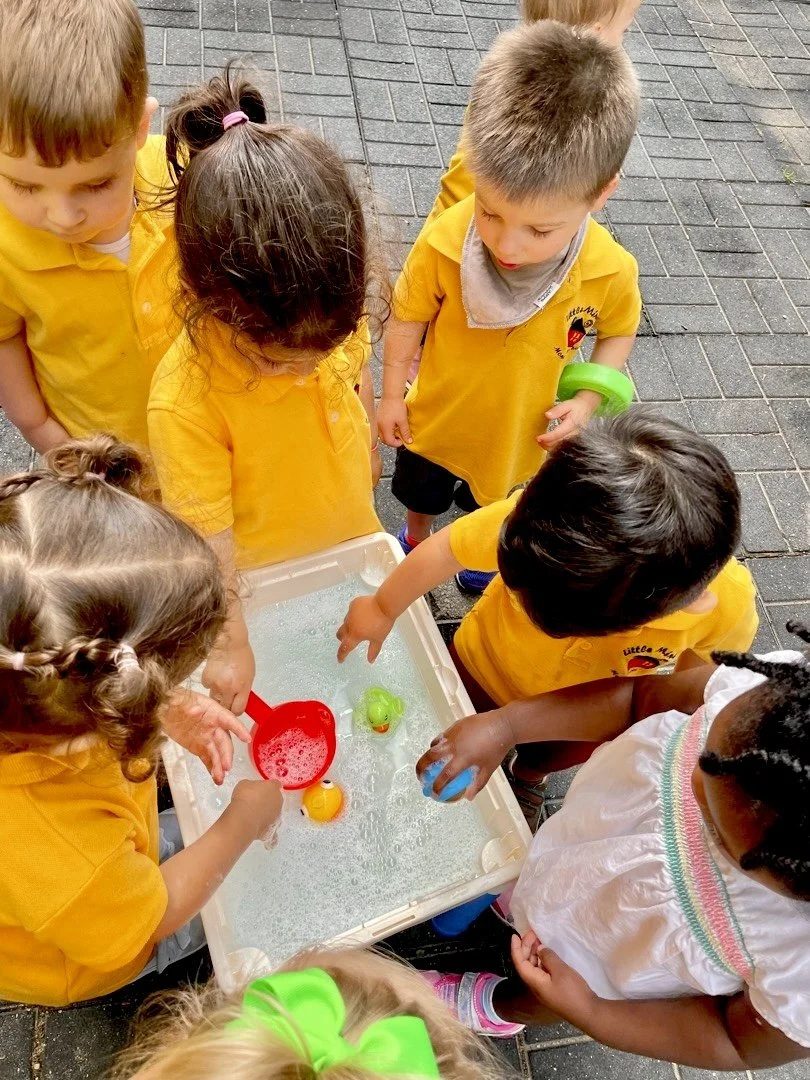
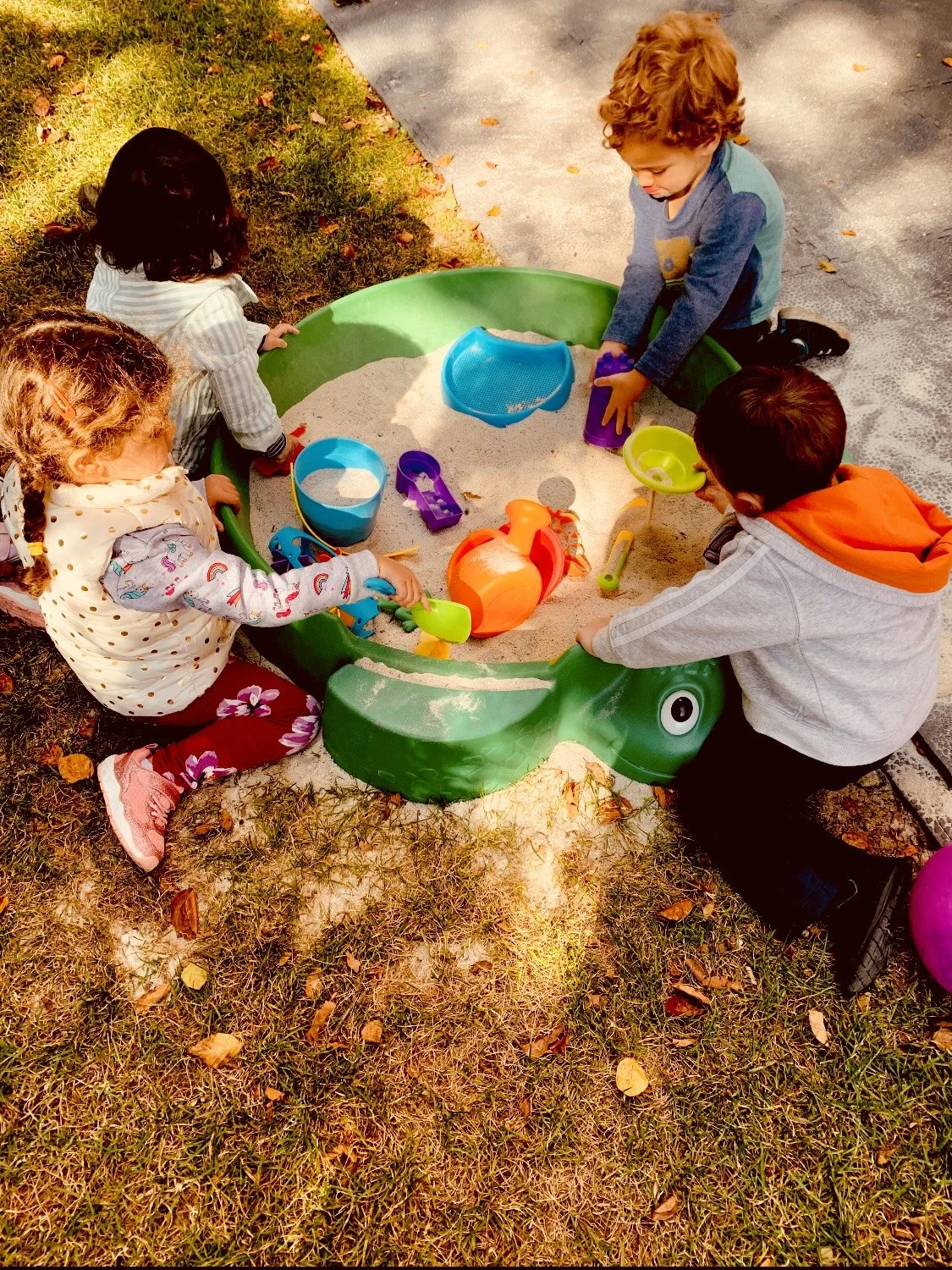
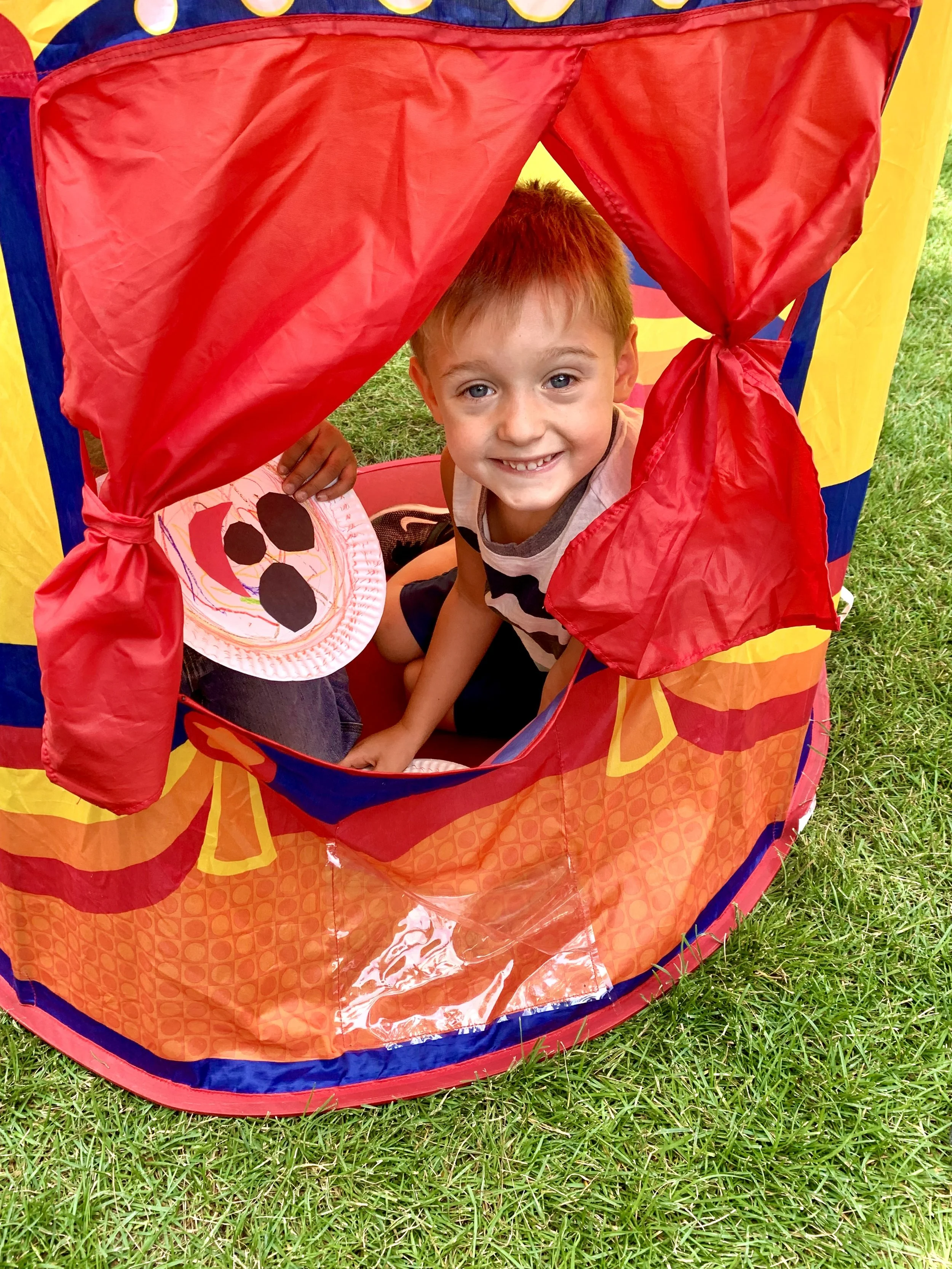
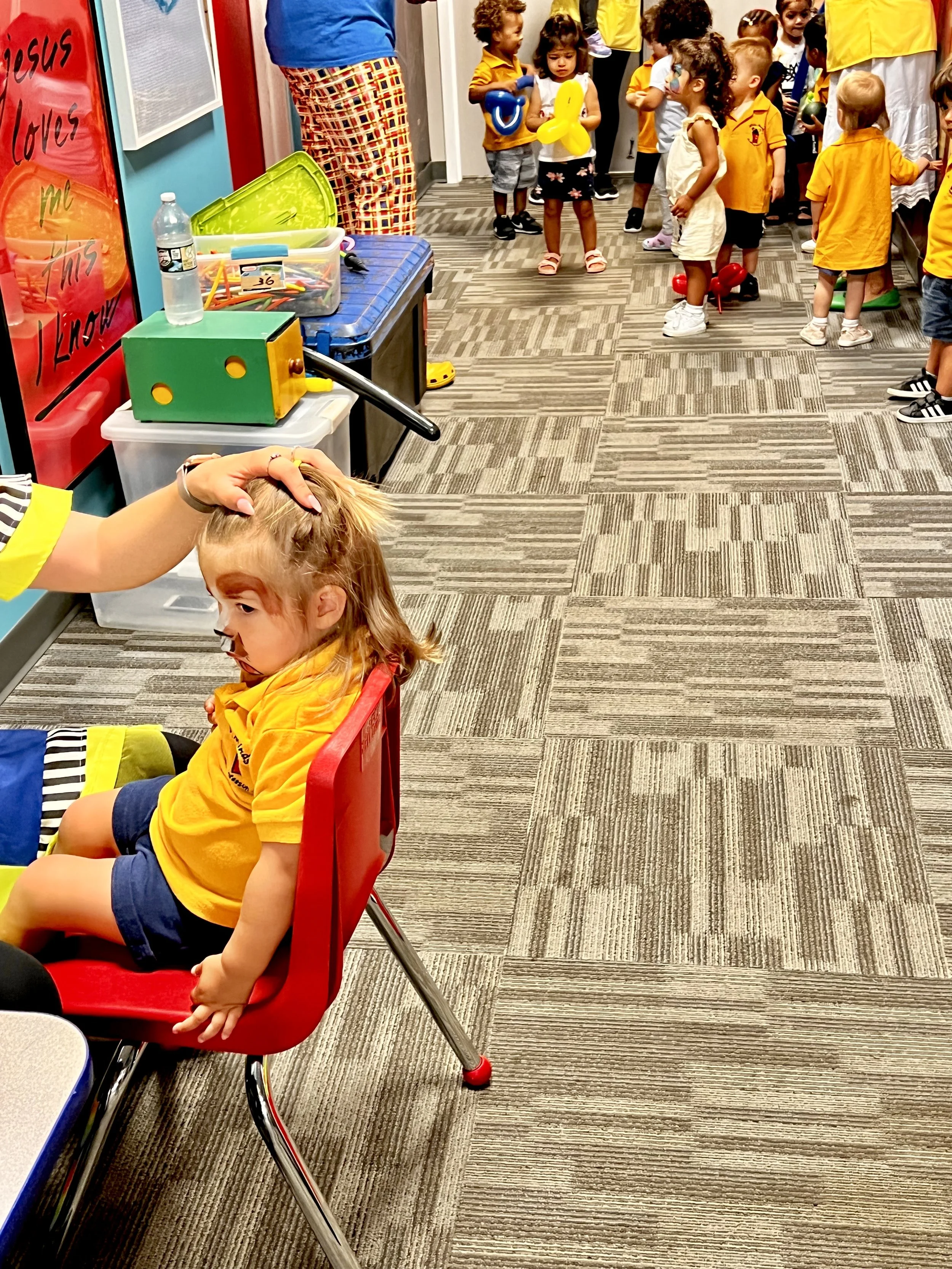
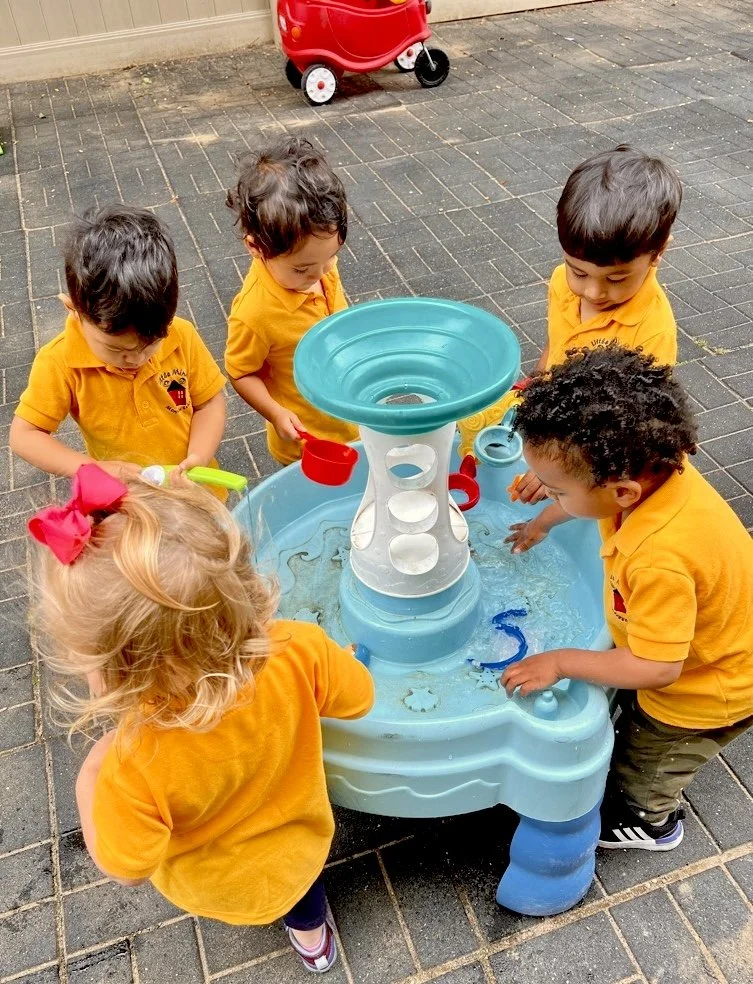
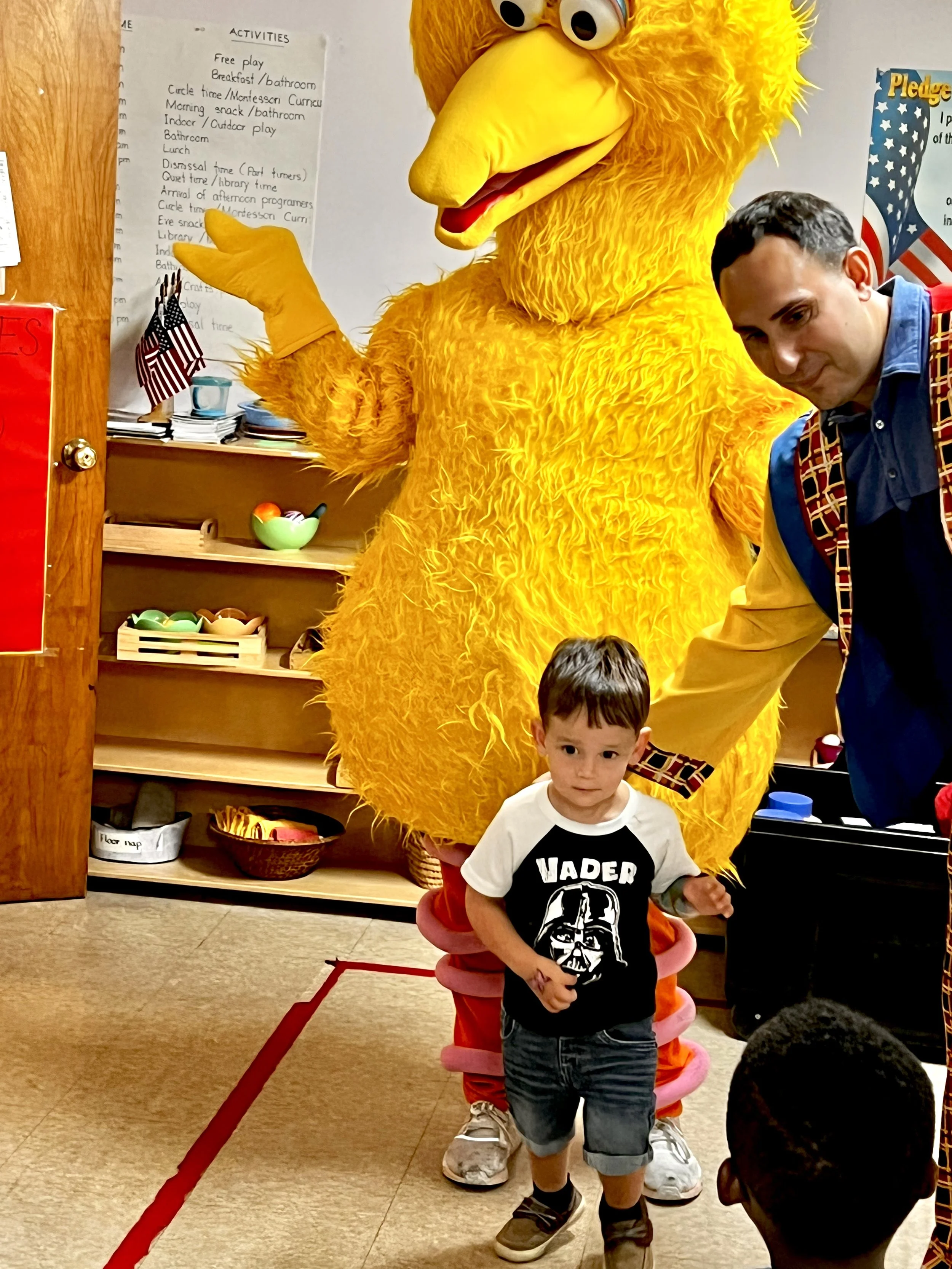

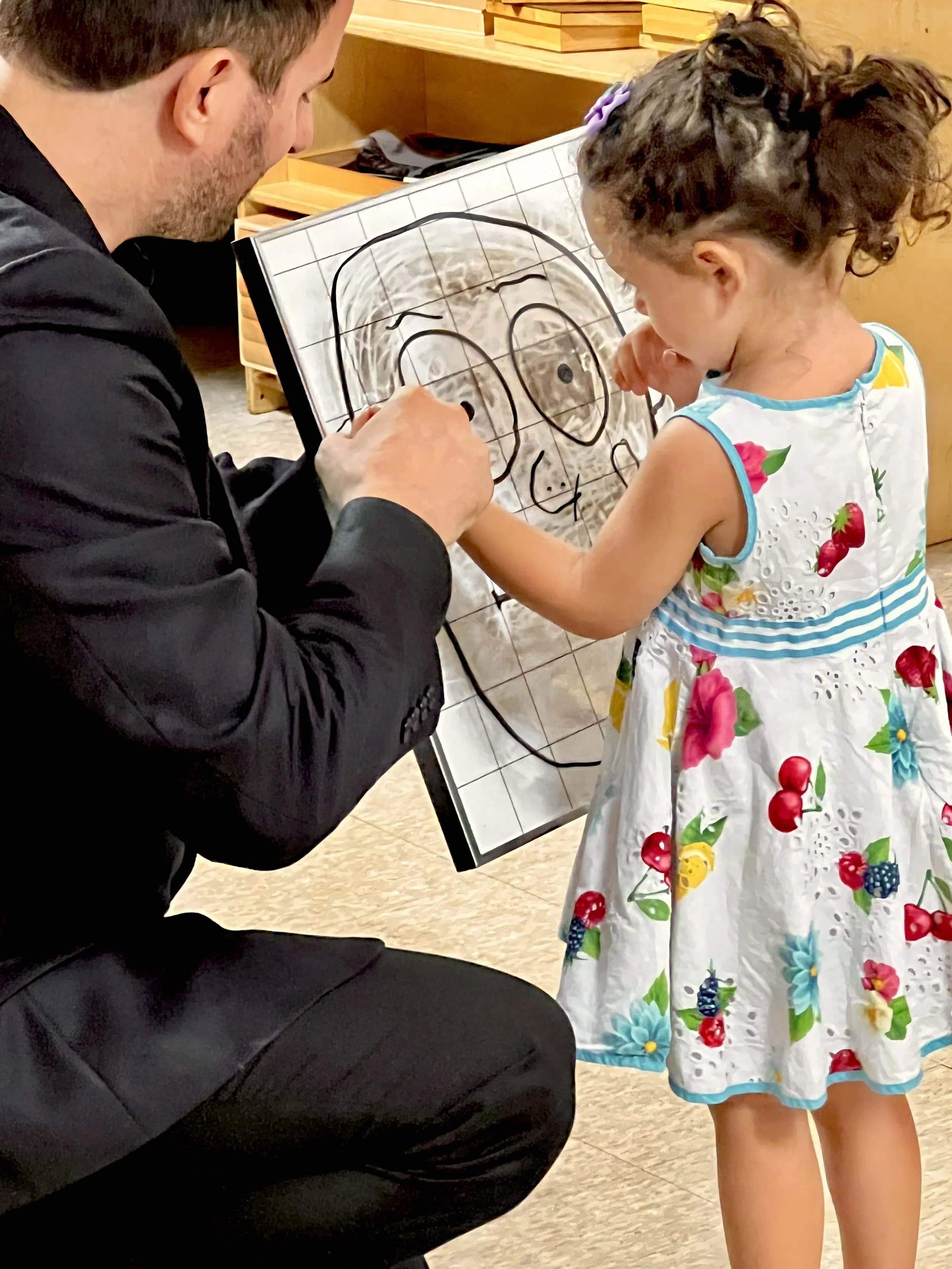
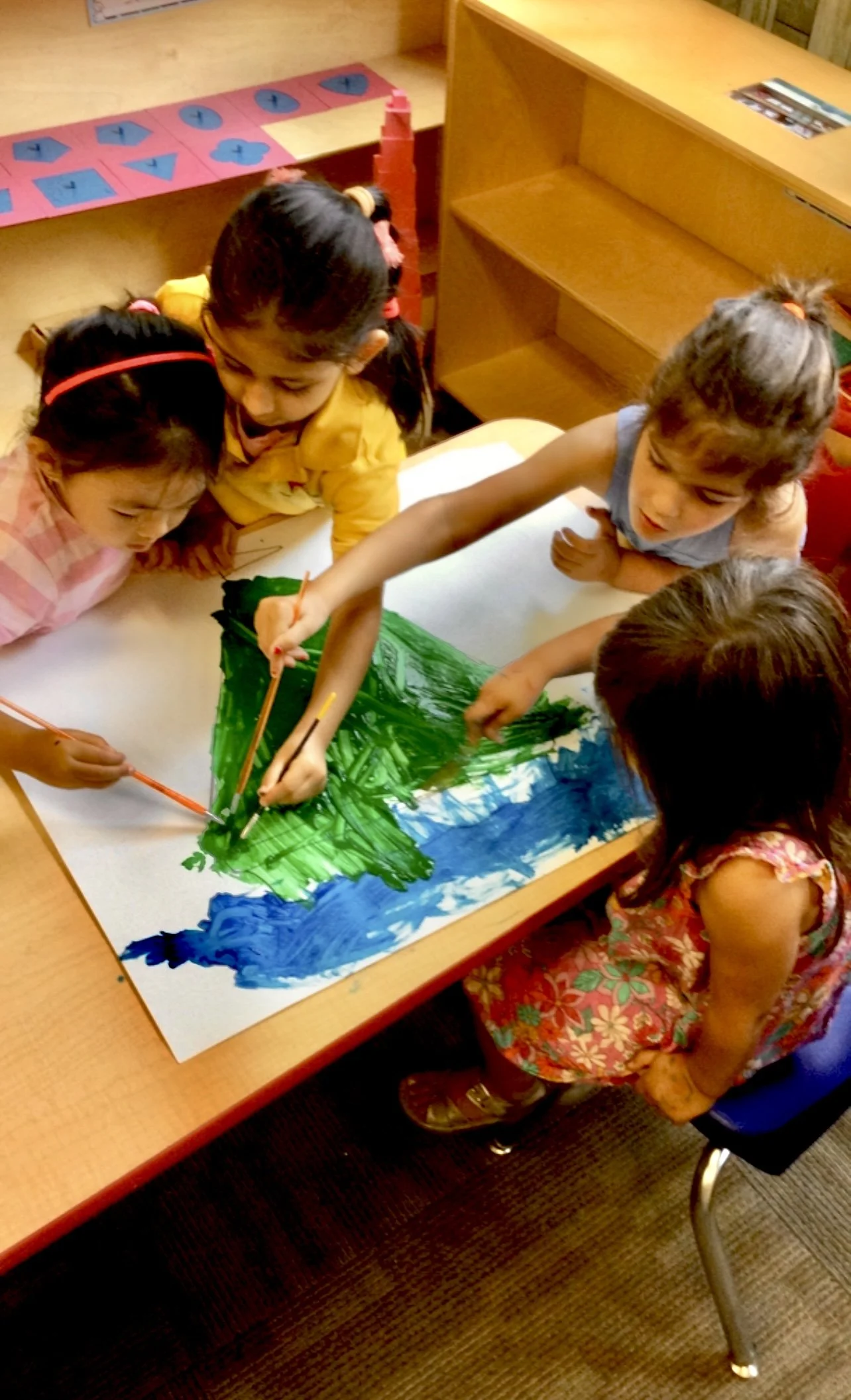
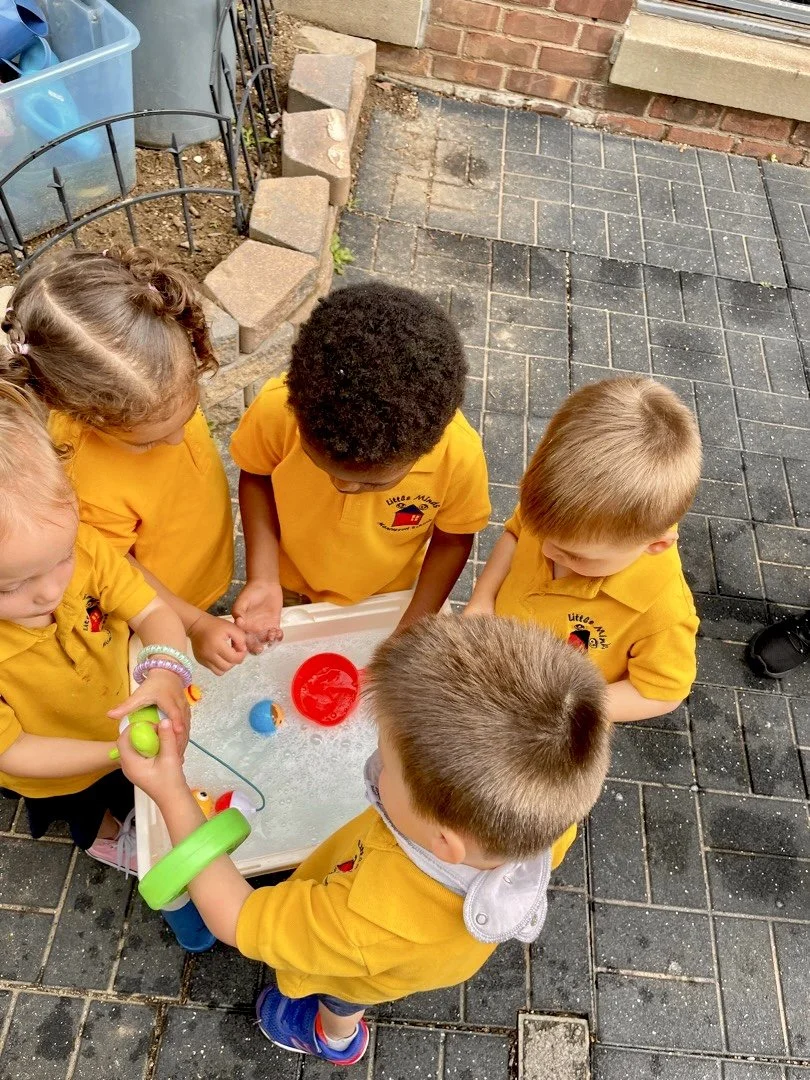
Music & Movement
Our music and movement yoga program offers a thoughtful blend of wellness, education, and innovation through music and movement. Children engage in activities that promote motor skills, balance, and physical awareness, all in a joyful, playful environment designed especially for young minds.
Inspire your child’s imagination through the power of music. At Little Minds Montessori, we nurture creativity and foster early musical development, providing each child with a strong foundation for self-expression and cognitive growth.
After School Program
Little Minds Montessori is now state licensed to offer a unique afterschool program designed for children 3-6 years, blending the renowned Montessori curriculum with engaging activities that foster independence, creativity, and a love for learning Monday through Friday.
Designated classrooms
2/3/5 day options
Montessori curriculum
Emphasis on social and emotional growth
Interactive learning with no screen time
Small class sizes
Individualized attention that fosters independence
Documenting Your
Child's Early Childhood Educational Journey…
At Little Minds Montessori, we believe in maintaining strong partnerships with parents through comprehensive progress reporting and meaningful conferences. Our assessment approach reflects the Montessori philosophy of observing and documenting each child's individual journey of discovery and growth.
Progress Report
We utilize a detailed Montessori Progress Report that tracks your child's development across all areas of the curriculum. Our assessment system uses three key indicators:
(P) Presented - The material or concept has been introduced to the child
(SW) Still Working - The child is actively practicing and developing this skill
(M) Mastered - The child has achieved competency in this area
Areas of Assessment
Practical Life Activities We observe your child's development in elementary movements, social relations, care of the environment, self-care skills, and social graces. This includes everything from pouring and carrying exercises to mastering dressing frames and demonstrating courtesy.
Sensorial Development Progress is tracked across all sensory areas including visual, tactile, baric (weight), thermic (temperature), acoustic, olfactory, and gustatory senses. We document work with materials like the pink tower, color tablets, geometric shapes, and sound cylinders.
Mathematics From number rods and sandpaper numerals to complex decimal system work, we track your child's mathematical journey through concrete to abstract understanding. This includes work with the golden bead material, addition and subtraction strip boards, and multiplication and division concepts.
Language Arts We document progress in spoken language, phonetic analysis, reading, writing, and grammar. This encompasses everything from sandpaper letter tracing to sentence analysis and creative expression.
Cultural Studies Progress in biology, geography, science, art, music, and cultural awareness is carefully tracked, including work with puzzle maps, life cycles, land and water forms, and cultural diversity activities.
Social and Emotional Development Beyond academic areas, we observe and report on crucial life skills including social behavior, work habits, independence, concentration, and emotional regulation.
Parent Teacher Meetings
We hold formal parent-teacher conferences once per year to discuss your child's progress in depth. During these meetings, we:
Review your child's comprehensive progress report together
Share observations about your child's interests, strengths, and areas of growth
Discuss your child's social and emotional development
Set collaborative goals for continued development
Answer any questions you may have about the Montessori approach or your child's experience
We understand that sometimes you may need to discuss your child's progress outside of the annual conference schedule. We welcome requests for additional meetings whenever you have concerns or would like to celebrate achievements. These meetings can address:
Specific developmental questions
Strategies for supporting learning at home
Transitions or changes in your child's life
Collaboration on addressing any challenges
Celebrating breakthrough moments and accomplishments
Our Partnership with our Families
We view our parents and families as essential partners in your child's education. Our detailed progress reports and conference opportunities ensure you stay informed and engaged in your child's Montessori and early childhood educational journey. Through open communication and collaboration, we work together to support each child in reaching their full potential through individualized assessment.
The combination of our comprehensive progress reports and regular communication opportunities with our families and parents ensures that you are always aware of your child's development and can actively participate in supporting their educational, social, psychological and emotional growth both at school and at home.
Schedule a Tour Today
Discover what makes Little Minds Montessori a truly special place for your child’s early learning journey.
We invite you to visit our thoughtfully prepared classrooms and experience the Montessori difference firsthand.
Enrollment is now open, and we are currently accepting applications online. Kindly Schedule a Tour to begin the admissions process.

